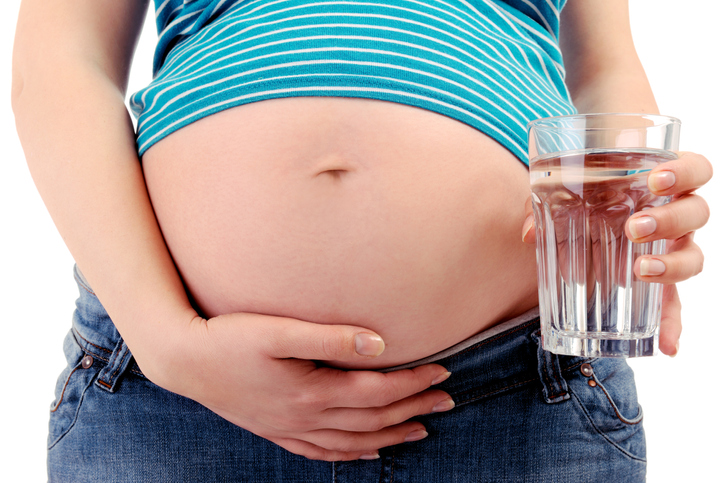Pregnant Women Should Not Eat For Two, But Perhaps They Should Be Drinking Water For Two

By Joy Stephenson-Laws, J.D., Founder
I recall gaining nearly 60 pounds when I was pregnant. I just could not seem to gain enough weight to satisfy my doctor. And I was not underweight when I got pregnant. At 5'10" I weighed about 145 pounds. By my ninth month, I was almost 200 pounds. It used to be quite common for doctors and others to tell pregnant patients that they were eating for two. "Eat as much as you want and whatever you want. Now is the time to do it,” they said.
However, now for the most part, I think people understand that overeating during pregnancy can actually be detrimental to the health of both the expectant mother and unborn baby. This is especially true for women who were already obese or overweight before they got pregnant.
(This is why I stress preconception health for both men and women).
What is less commonly discussed are the hydration needs during pregnancy.
“Water needs increase during pregnancy to support fetal development and maternal health, however little is known about the relationship between hydration status and outcomes on both mother and child,” according to this recent Medical Xpress report.
The report discusses a study in which researchers from Penn State analyzed the hydration status of pregnant women, how behavioral intervention made a difference and the effect of underhydration in pregnancy and birth outcomes.
Asher Rosinger, one of the lead researchers, said that it is recommended that pregnant women drink 300 milliliters of more water compared to women who are not pregnant or lactating.
"However, water recommendations do not specify differential water needs or hydration status recommendations by pregnancy month or trimester, nor do they take into account body composition, knowing that overweight and obesity increases probability of being underhydrated," Rosinger said.
I think that many people do not realize that being overweight makes them more at risk for being dehydrated.

According to the National Institutes of Health (NIH), “Obese individuals have higher water needs than nonobese individuals, because water needs depend upon metabolic rate, body surface area, and body weight. Water turnover rates increase with BMI based on higher energy requirements, greater food consumption, and higher metabolic production.”
Participants of the study included 14 pregnant women who received standardized prenatal care and then 13 pregnant women who received this standardized care in addition to the “Healthy Mom Zone” intervention (a program conducted by Penn State that strives to help overweight and obese women better manage their weight during pregnancy).
The women who received help from the Healthy Mom Zone intervention got guidance on diet, exercise, mental health and water intake. Hydration status was assessed by looking at urine samples. The researchers analyzed 653 urine samples taken weekly from the women.
Water intake needs increase by trimester.
The results showed that overall as women got further along in their pregnancies the more underhydrated they became (during the second trimester and early part of the third trimester particularly).
The researchers also saw that the women who were part of the intervention program overall had better hydration statuses compared to the women who did not participate in the program. Hydration status also appears to affect birth weight and length. Women who were not adequately hydrated during their second trimester had babies with lower birth weights.
"Our results are significant considering increased water needs during pregnancy and research suggesting that large proportions of pregnant women in different parts of the world fail to meet recommendations on adequate water intake," Rosinger, one of the lead researchers mentioned earlier, said.
"We typically treat pregnancy as one stage with respect to water needs, but all stages are different and include varying experiences and physiological demands. Recommendations by trimester should be developed, along with an emphasis on staying hydrated. It's just as important as increasing dietary needs during pregnancy."
Water is one of the six basic nutrients you need to live. The others are protein, carbohydrates, fats, vitamins and minerals. But water is the only nutrient where absence will cause death within days. No wonder why women need more water to healthily grow a new life!
If you find drinking adequate water is difficult for you, here are some tips:
- Always keep a reusable water bottle by your side. Fill it up before bed, place it on your night stand and drink first thing when you wake up. We all wake up dehydrated after hours of sleeping.
- Infuse your water with nutrient-dense foods such as berries, basil, ginger and cucumber. This is great for pregnant women, because along with providing hydration this helps add those key nutrients that are so important in having a healthy pregnancy.
- Eat plenty of water-rich foods such as watermelon and cucumber. Soups and smoothies are also great for hydration and nutrients.
- Don’t wait to feel thirsty. Set an alarm on your phone to drink water regularly if you are forgetful.
- Check the color of your urine. If it is very yellow or brownish, you are definitely not hydrated enough.
Of course, it is important to receive the proper prenatal care if you are pregnant. Discuss your personal hydration needs (remember your weight and body mass and how far along you are into your pregnancy can determine your hydration needs) with your doctor. Finally, limit caffeine intake and be extra mindful during these warmer summer months.
Enjoy your healthy life!
Disclaimer: This article is not intended to provide medical advice. Please consult with your doctor or another competent healthcare practitioner to get specific medical advice for your situation.
The pH professional health care team includes recognized experts from a variety of health care and related disciplines, including physicians, attorneys, nutritionists, nurses and certified fitness instructors. This team also includes the members of the pH Medical Advisory Board, which constantly monitors all pH programs, products and services. To learn more about the pH Medical Advisory Board, click here.







